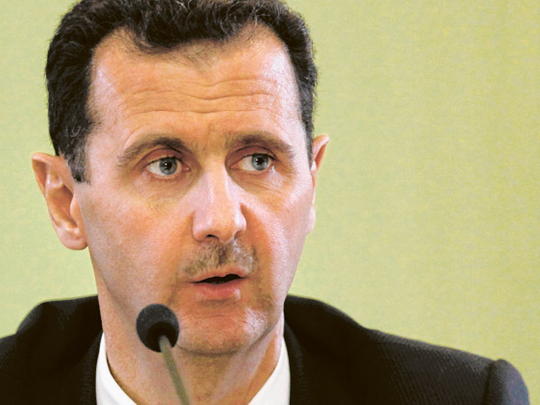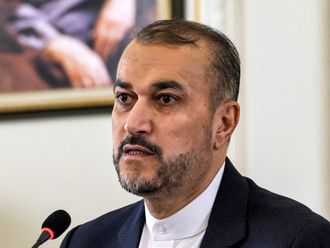
Aleppo: A Syrian minister held out the prospect Tuesday that embattled President Bashar Al Assad could leave power as part of a negotiated settlement to the increasingly ferocious conflict.
The surprise comments by a Syrian envoy visiting Moscow emerged after US President Barack Obama ratcheted up the pressure on Damascus over its chemical weapons arsenal and the fate of its autocratic leader.
In Syria itself, at least 58 people were killed nationwide, among them women and children, activists said, reporting relentless shelling and fighting across swathes of the main battleground of Aleppo as well as around the capital.
"As far as his resignation goes - making the resignation itself a condition for holding dialogue means that you will never be able to reach this dialogue," Syrian Deputy Prime Minister Qadri Jamil said after talks in Moscow.
But he added: "Any problems can be discussed during negotiations. We are even ready to discuss this issue."
According to political sources in Damascus, Jamil was sent to Moscow to discuss a possible plan for presidential elections in Syria in which all candidates would be allowed to stand, including Al Assad.
The exiled opposition umbrella group the Syrian National Council said it was studying the formation of a transitional government, but did not elaborate on whether it could include regime figures.
The West has long demanded Al Assad's departure, accusing him of butchering his own people during a 17-month conflict that began as a peaceful uprising but has deteriorated into a brutal fight between regime forces and armed rebels.
Syria's traditional allies Russia and China have blocked UN resolutions on the conflict, rejecting what they see as foreign attempts at regime change, leaving the international community all but powerless to stop the bloodshed.
Activists say more than 23,000 people have been killed since March 2011, while the UN puts the death toll at 17,000 and says hundreds of thousands more have fled or been made homeless in a major humanitarian crisis.
Al Assad himself has been hit by a wave of defections, including by a former prime minister, and the killing of four top security chiefs in a July bombing.
On the ground, heavy shelling was reported across many parts of Aleppo, including an area where a Japanese journalist was killed in gunfire on Monday, while warplanes bombarded the northern town of Marea, activists said.
The rebel Free Syrian Army said it controlled almost two thirds of Aleppo, where major fighting first erupted a month ago, but a security source in Damascus rejected the claims.
Obama had put Al Assad's regime on notice Monday that although he had not ordered military action "at this point", Washington would regard any recourse by Damascus to its deadly arsenal as crossing a "red line".
"There would be enormous consequences if we start seeing movement on the chemical weapons front or the use of chemical weapons... That would change my calculations significantly," he told reporters.
Syria's admitted in July that it has chemical weapons and could use them in case of any "external aggression."
Jamil brushed off Obama's comments as "simply propaganda linked to the US election" while Russian Foreign Minister Lavrov said: "There should be no interference from the outside."
"The only thing that foreign players should do is create conditions for the start of dialogue," he said, but also told Jamil that efforts by Damascus to end the conflict were "not enough."
Lakhdar Brahimi, who replaced Kofi Annan as international Syria envoy, warned Sunday that it was now a matter of ending civil war rather than avoiding it, but has come under fire for failing to call for Al Assad to go.
Syria insists it is fighting an insurgency by "armed terrorist groups" backed by the West, Gulf states and Turkey.
The conflict has descended into bloody stalemate, with scores of people reportedly killed daily as the regime battles rebels in their main strongholds and other pockets of resistance nationwide.
A top FSA commander, Colonel Abdul Jabbar Al Okaidi, said the rebels now controlled 60 per cent of Aleppo, the now battered manufacturing hub that was largely spared the fighting until a month ago.
"The people are with us," he said. "How else do you think we could have lasted a month?"
But a security source in Damascus dismissed the claims as "completely false."
"The terrorists are not advancing, it is the army that is making slow progress," he said, but added: "Reinforcements from both sides are heading to Aleppo. It is a war that will last a long time."
The relentless fighting has triggered a mass exodus and left another 2.5 million in need of aid inside the country, creating what a US State Department official said was one of the worst crises in the world today,
"It's like nothing I've seen in any conflict I've ever been involved in, the level of attacks against people simply trying to provide humanitarian assistance," said Mark Bartolini, director of the office of US Foreign Disaster Assistance.
Activists also reported troops had stormed a town near Damascus, torching homes and shops, while helicopters and warplanes strafed several suburbs of the capital, which the regime claimed to have largely retaken last month.
The death of Japanese female reporter Mika Yamamoto, 45, brought to four the number of foreign journalists killed since the uprising erupted, while a number of Syrian journalists have also died.
The FSA also said that a Palestinian journalist and a Turkish cameraman with Arabic-language Al Hurra television had been seized by pro-government militia in Aleppo, but this could not be independently confirmed.
The conflict spilled over again into neighbouring Lebanon, with five dead in clashes between pro- and anti-Damascus regime supporters in the northern port of Tripoli, security officials said.












